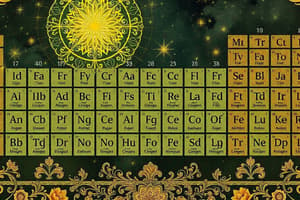Podcast
Questions and Answers
Who arranged the elements in order of increasing atomic number?
Who arranged the elements in order of increasing atomic number?
- Lothar Meyer
- Dmitri Mendeleev
- Henry Moseley (correct)
- John Newlands
Dmitri Mendeleev created the law of octaves.
Dmitri Mendeleev created the law of octaves.
False (B)
What did John Newlands notice about the properties of elements?
What did John Newlands notice about the properties of elements?
He noticed the repetition of the properties every eight elements.
Henry Moseley arranged elements based on their unique number of __________.
Henry Moseley arranged elements based on their unique number of __________.
Match the following scientists with their contributions:
Match the following scientists with their contributions:
Flashcards
Newlands' Law of Octaves
Newlands' Law of Octaves
John Newlands arranged elements by increasing atomic mass and noticed that the properties repeated every eight elements, leading to his Law of Octaves.
Lothar Meyer's Work
Lothar Meyer's Work
Lothar Meyer found a relationship between the atomic mass of an element and its properties. He arranged elements in order of increasing atomic mass.
Mendeleev's Periodic Table
Mendeleev's Periodic Table
Dmitri Mendeleev recognized a connection between atomic mass and element properties. He arranged elements in order of increasing atomic mass and used this to predict the properties of undiscovered elements.
Moseley's Atomic Number
Moseley's Atomic Number
Signup and view all the flashcards
Periodic Law
Periodic Law
Signup and view all the flashcards
Study Notes
Early Periodic Table Development
- John Newlands organized elements by increasing atomic mass, noticing repeating properties every eight elements. This was known as the law of octaves.
Lothar Meyer and Dmitri Mendeleev
- Lothar Meyer and Dmitri Mendeleev independently recognized a relationship between atomic mass and element properties.
- Both arranged elements in order of increasing atomic mass.
Mendeleev's Key Contribution
- Mendeleev predicted the existence and properties of undiscovered elements based on gaps in his table.
Henry Moseley's Crucial Advancement
- Henry Moseley discovered that each atom has a unique number of protons, termed the atomic number.
- Moseley's arrangement of elements by increasing atomic number revealed a clear periodic pattern of properties, improving on earlier models that focused on atomic mass.
Studying That Suits You
Use AI to generate personalized quizzes and flashcards to suit your learning preferences.
Description
Explore the history and evolution of the periodic table, from John Newlands' law of octaves to Mendeleev's predictions and Moseley's atomic number. This quiz covers key contributions and significant scientists who shaped modern chemistry. Test your knowledge on the foundational developments of this essential scientific tool.



